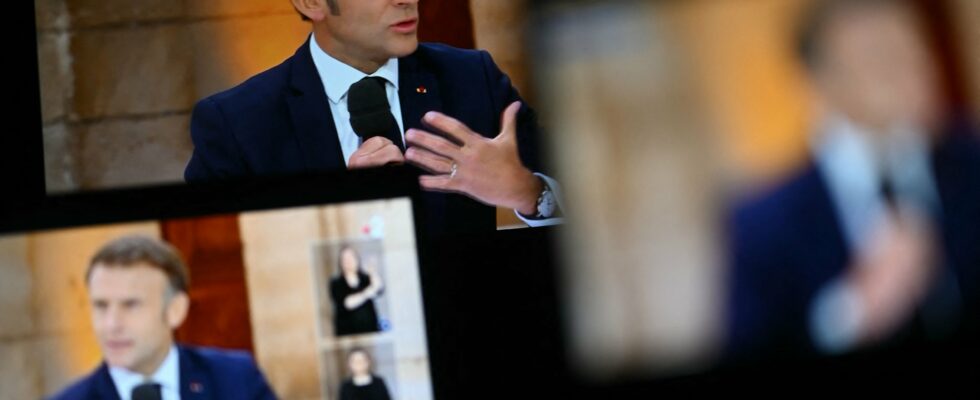In front of his coffee, this European diplomat shakes his head, as if he cannot believe it. “For two years, we have been hoping for a European leader who will stand up to Putin and lead the West behind him to support Ukraine… Macron had become this leader a few weeks ago, and here he is paralyzed!” A political earthquake occurred in Paris on June 9, and since then its tremors have shaken the entire European continent.
Sunday evening, by announcing to dissolve the National Assembly, Emmanuel Macron stunned France and froze his counterparts abroad. Four days earlier, the Head of State received with great pomp the elite of the Western world on the beaches of Normandy, with moving memories of the resistance of the free world against fascism 80 years ago.
Then the dissolution, and these polls which gave a majority to the National Rally, an anti-NATO, anti-European Union party and formerly financed by a Russian bank. The cold shower. “Abroad and in embassies, there is astonishment,” says François Heisbourg, special advisor to the Foundation for Strategic Research. “Diplomats need time to absorb the implications of this French shock.” The consequences for French diplomacy are already there, well before the second round of legislative elections on July 7.
A G7 without the French Minister of Foreign Affairs
This Thursday, Emmanuel Macron is going to Puglia, Italy, for a necessarily special G7 summit. While the war rages in Ukraine and the Gaza Strip, three Western leaders – the French president but also the British Rishi Sunak and the American Joe Biden – face perilous elections in the coming weeks or months. In the presence of Volodymyr Zelensky, crucial decisions should however be unblocked, in particular on the use of the 300 billion dollars of Russian assets frozen in the West: according to our information, the G7 should decide, as a first step, to unblock the interest generated by these sums to finance the reconstruction of Ukraine.
The French Minister of Foreign Affairs, Stéphane Séjourné, will not be at this summit. He remains in Paris for the legislative campaign and his office indicates that there is “no visibility” on his travels abroad in the coming days. For three weeks, French diplomacy will appear suspended from the electoral chaos in France. “At the G7, Macron will explain to our playmates that the situation is under control and that he will succeed, argues François Heisbourg. But it is unlikely that this will be the tone of the messages sent by the embassies to their capitals… “
This period of uncertainty in French diplomacy corresponds to decisive weeks on the international scene: after the G7, Western leaders are meeting in Switzerland this weekend for a Peace Conference on Ukraine, then the European “top jobs” will be discussed in Brussels and, finally, a NATO summit is being prepared in Washington DC on July 9, two days after the second round of legislative elections. Without mentioning the preparation for the Olympic Games, which will see the whole world descend on Paris from July 26. A European diplomat, passing through France, sums up the state of mind of his hierarchy: “We understand that Macron could not remain still in the face of such a score from the extreme right, but what concern for the future of the ‘Europe!’
A coming clash over Ukraine?
If the shadow of the RN now looms over the entire continent, this is particularly true for Ukraine. Three days before dissolving the National Assembly, Emmanuel Macron promised Volodymyr Zelensky Mirage 2000-5 fighter planes, 650 million euros in additional aid and a plan to send Western military instructors to Ukrainian soil.
Today, doubt obscures all of these projects, in the event of cohabitation with a party recently aligned with the Kremlin line. Is the delivery of arms to an allied country part of the “domain reserved” for the President of the Republic? Could a Minister of the Armed Forces from the National Rally block them? On these issues, as on many others, the procedures, evident today, could lead to complex confrontations tomorrow. “But I would be surprised if a battlefield opened up on Ukrainian policy at the Elysée,” said François Heisbourg. Marine Le Pen had carefully avoided this issue during the presidential election, unlike Eric Zemmour who had done so. a campaign theme, which caused it to fall from 14 to 7%… On Ukraine, even in the event of cohabitation, the year 2024 should not be complicated, unless Jordan Bardella seeks confrontation on these subjects .”
As head of the military, the president should have the final say on military aid. For financial aid, on the other hand, it absolutely must go through Parliament. The results of July 7 will therefore have an immediate impact for kyiv. For 2024, the three billion euros of French aid to Ukraine have already been voted on and the budget lines adopted by the parliamentary committee. The RN abstained, France Insoumise voted against.
But for 2025, the budgetary battle promises to be terrible in the event of a far-right majority in the Assembly and Ukraine could suffer. An observation which causes great concern among all kyiv supporters. “I do not want to interfere in the internal affairs of France,” confides the former NATO Secretary General, Anders Fogh Rasmussen, who is very committed to Ukrainian security. “But I hope that the French people will elect a National Assembly that supports Ukraine in its fight for truly French values: freedom, equality, fraternity and against tyranny!”
.
